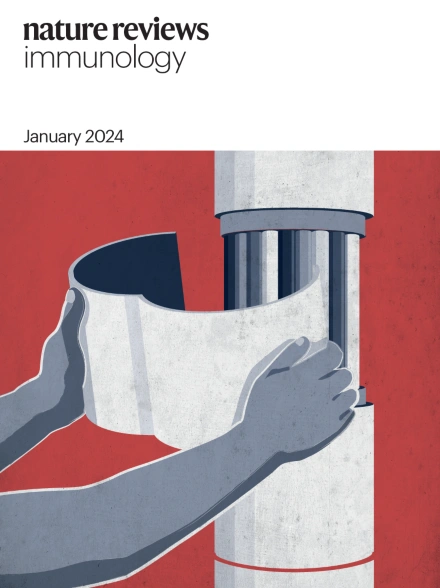T cell exhaustion: early or late in tumour progression?
IF 60.9
1区 医学
Q1 IMMUNOLOGY
引用次数: 0
Abstract
Chronic antigen exposure underlies the stepwise acquisition of a terminally dysfunctional state by CD8+ T cells, commonly known as exhaustion, which is considered a major cause of failed cancer immunosurveillance. Recent data from models of viral infection show that the precursors of terminally exhausted T cells emerge early during disease course, prior to continuous signalling through the T cell receptor. I speculate that these findings might indicate that, at least in some settings, T cell exhaustion may emerge as a late consequence — rather than an early determinant — of cancer progression. Recent studies in mouse models of viral infection showed that precursors of terminally exhausted T cells emerge early during the course of disease. Here, Galluzzi discusses these findings and what they may mean for our understanding of tumour immunology and responses to immunotherapy with immune checkpoint blockade.T细胞衰竭:肿瘤进展的早期还是晚期?
慢性抗原暴露是CD8+ T细胞逐步获得最终功能失调状态的基础,通常被称为衰竭,这被认为是癌症免疫监视失败的主要原因。来自病毒感染模型的最新数据表明,在疾病过程中,在通过T细胞受体连续信号传导之前,终末耗竭T细胞的前体出现得较早。我推测,这些发现可能表明,至少在某些情况下,T细胞衰竭可能是癌症进展的晚期结果,而不是早期决定因素。最近对病毒感染小鼠模型的研究表明,终末耗竭T细胞的前体在疾病过程中出现得较早。在这里,Galluzzi讨论了这些发现,以及它们对我们理解肿瘤免疫学和免疫检查点阻断免疫治疗反应的意义。
本文章由计算机程序翻译,如有差异,请以英文原文为准。
求助全文
约1分钟内获得全文
求助全文
来源期刊

Nature Reviews Immunology
医学-免疫学
CiteScore
93.40
自引率
0.40%
发文量
131
审稿时长
6-12 weeks
期刊介绍:
Nature Reviews Immunology is a journal that provides comprehensive coverage of all areas of immunology, including fundamental mechanisms and applied aspects. It has two international standard serial numbers (ISSN): 1474-1733 for print and 1474-1741 for online. In addition to review articles, the journal also features recent developments and new primary papers in the field, as well as reflections on influential people, papers, and events in the development of immunology. The subjects covered by Nature Reviews Immunology include allergy and asthma, autoimmunity, antigen processing and presentation, apoptosis and cell death, chemokines and chemokine receptors, cytokines and cytokine receptors, development and function of cells of the immune system, haematopoiesis, infection and immunity, immunotherapy, innate immunity, mucosal immunology and the microbiota, regulation of the immune response, signalling in the immune system, transplantation, tumour immunology and immunotherapy, and vaccine development.
 求助内容:
求助内容: 应助结果提醒方式:
应助结果提醒方式:


